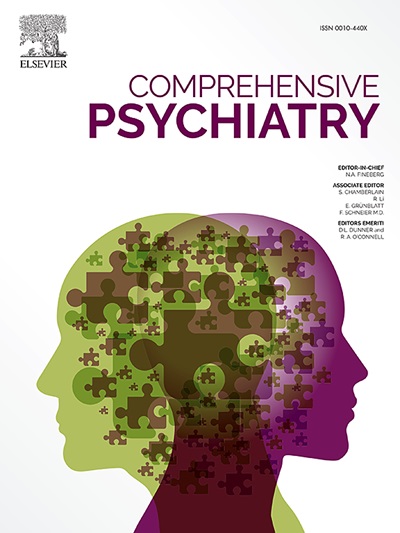中国大学生在covid -19大流行期间和之后的身体活动和睡眠与心理健康的关系:一项纵向队列研究
IF 4.2
2区 医学
Q1 PSYCHIATRY
引用次数: 0
摘要
新冠肺炎疫情严重影响了人们的生活方式,导致身体活动、睡眠和心理健康发生变化。本研究旨在评估新冠肺炎大流行后中国大学生这些指标的恢复情况,并探讨生活方式改变与心理问题的关系。方法对河北省2748名大学生进行两波纵向调查。自我报告问卷在2022年和2024年测量了身体活动、睡眠和心理变量(抑郁症状、焦虑症状和感知压力)。McNemar卡方检验比较了两波之间的差异。此外,还进行了单变量和多变量逻辑回归分析,以检验这一时期生活方式行为变化与心理问题之间的独立和联合关联。结果疫情后缺乏身体活动的比例从22.5%下降到16.2%,睡眠质量差的比例从18.3%下降到16.2% (P <;0.05)。抑郁症状和焦虑症状也有所改善(P <;0.05),而感知压力仍然很高(64.5%)。与一贯不运动的学生相比,积极运动的学生(抑郁OR = 0.40,焦虑OR = 0.34,压力0.56)和持续运动的学生(抑郁OR = 0.43,焦虑OR = 0.38,压力0.47)的心理症状有所减轻。然而,在调整混杂因素后,改善身体活动与心理健康问题之间的关联不显著(P >;0.05)。改善睡眠(抑郁OR = 0.42,焦虑OR = 0.24,压力OR = 0.42)和持续良好睡眠(抑郁OR = 0.20,焦虑OR = 0.20,压力0.37)在完全调整人口统计学和社会经济地位后也显示出保护作用。结论:本研究发现高感知压力持续存在。虽然在此期间身体活动有所改善,但调整后的变化与心理健康没有显著关联。然而,睡眠质量的改善与抑郁水平、焦虑水平和感知压力的减少显著相关。这些发现强调了睡眠和身体活动对大流行后精神健康恢复的重要性,以及采取有针对性干预措施的必要性。本文章由计算机程序翻译,如有差异,请以英文原文为准。
Associations of physical activity and sleep with mental health during and post-COVID-19 pandemic in chinese college students: a longitudinal cohort study
Background
The COVID-19 pandemic seriously impacted people's lifestyles, leading to changes in physical activity, sleep and mental health. This study aimed to assess the recovery of these indicators in Chinese university students post-COVID-19 pandemic, and explore the association between lifestyle changes and psychological problems.
Methods
A two-wave longitudinal study was conducted with 2,748 college students in Hebei, China. Self-report questionnaires measured physical activity, sleep and psychological variables (depression symptoms, anxiety symptoms, and perceived stress) in 2022 and 2024. McNemar chi-square test compared differences between the two waves. Additionally, univariate and multivariate logistic regression analyses were performed to examine the independent and joint associations between changes in lifestyle behaviors and psychological problems across this period.
Results
Proportion of physical inactivity decreased from 22.5% to 16.2%, and poor sleep quality reduced from 18.3% to 16.2% after the pandemic (P < 0.05). Depression symptoms and anxiety symptoms also improved (P < 0.05), while perceived stress remained high (64.5%). Compared to consistently inactive students, those becoming physically active (depression OR = 0.40, anxiety OR = 0.34, stress 0.56) and those persistently active (depression OR = 0.43, anxiety OR = 0.38, stress 0.47) had reduced psychological symptoms. However, after adjusting for confounders, the association between improved physical activity and mental health problems was insignificant (P > 0.05). Improved sleep (depression OR = 0.42, anxiety OR = 0.24, stress 0.42) and consistently good sleep (depression OR = 0.20, anxiety OR = 0.20, stress 0.37) also demonstrated a protective effect after fully adjusting for demographics and socioeconomic status.
Conclusions
This study found that high perceived stress persisted. Although physical activity improved across this period, its change was not significantly associated with mental health after adjustments. However, improved sleep quality was significantly associated with reductions in depression levels, anxiety levels, and perceived stress. These findings highlight the importance of sleep and physical activity in mental health recovery post-pandemic and the need for targeted interventions.
求助全文
通过发布文献求助,成功后即可免费获取论文全文。
去求助
来源期刊

Comprehensive psychiatry
医学-精神病学
CiteScore
12.50
自引率
1.40%
发文量
64
审稿时长
29 days
期刊介绍:
"Comprehensive Psychiatry" is an open access, peer-reviewed journal dedicated to the field of psychiatry and mental health. Its primary mission is to share the latest advancements in knowledge to enhance patient care and deepen the understanding of mental illnesses. The journal is supported by a diverse team of international editors and peer reviewers, ensuring the publication of high-quality research with a strong focus on clinical relevance and the implications for psychopathology.
"Comprehensive Psychiatry" encourages authors to present their research in an accessible manner, facilitating engagement with clinicians, policymakers, and the broader public. By embracing an open access policy, the journal aims to maximize the global impact of its content, making it readily available to a wide audience and fostering scientific collaboration and public awareness beyond the traditional academic community. This approach is designed to promote a more inclusive and informed dialogue on mental health, contributing to the overall progress in the field.
 求助内容:
求助内容: 应助结果提醒方式:
应助结果提醒方式:


